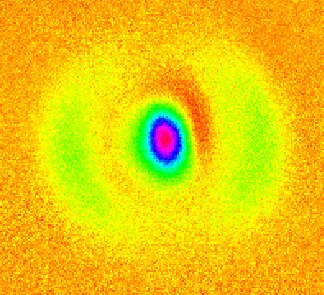(Phys.org) In recent years, many physicists worldwide have introduced atomic clocks, systems to measure the passing of time that are based on quantum states of atoms. These clocks can have numerous valuable applications, for instance, in the development of satellite and navigation systems.
Lately, some researchers have also been exploring the possible development of molecular clocks, systems that resemble atomic clocks, but based on simple molecules. A team at Columbia University and University of Warsaw recently created a highly accurate molecular clock that could be used to study new physical phenomena.
“Our recent paper is the result of a multi-year effort to create what is called a molecular clock,” Tanya Zelevinsky, one of the researchers who carried out the study, told Phys.org. “It was inspired by the rapid progress in the precision of atomic clocks, and the realization that molecular clocks rely on a different ‘ticking’ mechanism, and thus could be sensitive to complementary phenomena. One of these is the idea that the fundamental constants of nature might change very slightly over time. The other is the possibility that gravity between very small objects may be different from what we experience at larger scales.”
The molecular clock created by Zelevinsky and her colleagues is based on the diatomic molecule Sr2, structurally resembling two tiny spheres connected by a spring. The clock specifically uses the vibrational modes of this molecule as a precise frequency reference, which in turn allows it to keep track of time.
“Our clock requires the use of lasers to cool atoms near absolute zero and hold them in optical traps, induce them to combine into molecules, and shine highly precise ‘clock’ lasers at them to actually make a measurement,” Zelevinsky explained. “Some of the advantages of the molecular clock include its very low sensitivity to stray magnetic or electric fields, and the very long natural lifetimes of the vibrational modes.”
In their study published in Physical Review X, Zelevinsky and her colleagues evaluated the precision of their molecular clock in a series of tests, measuring its so-called systematic uncertainty. They found that their proposed design minimized sources of errors significantly and their clock achieved a total systematic uncertainty of 4.6×10−14, exhibiting a notably high precision.
“Our recent work sets the benchmark for the precision of molecular spectroscopy, with the observed measure of the peak sharpness – or its quality factor – of 3 trillion,” Zelevinsky said. “It also illuminates the effects that limit this precision, in particular, the eventual loss of molecules via scattering of the light in which they are trapped. This inspires us to search for improvements in the optical trapping strategy.”
The vibrational molecular clock created by this team of researchers could become a standard for terahertz frequency applications, while potentially informing the creation of new molecular spectroscopy tools. Its design could also be altered, substituting the Sr2 molecules with other isotopic variants (with different mass), which could aid ongoing searches for new physical interactions.
“In the future, we hope to apply the molecular clock to understand molecular structure at the highest precision, and to study any possible signatures of non-Newtonian gravity at nanometer size scales,” Zelevinsky said.
https://phys.org/news/2023-04-highly-precise-terahertz-molecular-clock.html


